- Clone
- B3B4 (See other available formats)
- Regulatory Status
- RUO
- Other Names
- FcεRII, IgE Fc Receptor, BLAST-2, Ly-42, B6
- Isotype
- Rat IgG2a, κ
- Ave. Rating
- Submit a Review
- Product Citations
- publications
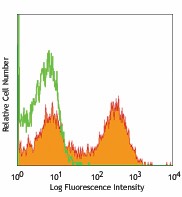
-

CD57BL/6 mouse splenocytes were stained with CD23 (clone B3B4) PE (filled histogram), or rat IgG2a, κ PE (open histogram).
| Cat # | Size | Price | Quantity Check Availability | Save | ||
|---|---|---|---|---|---|---|
| 101607 | 50 µg | 88€ | ||||
| 101608 | 200 µg | 235€ | ||||
CD23 is a 45 kD protein also known as low affinity IgE Fc receptor, FcεRII, BLAST-2, Ly-42, or B6. It is a member of the Ig family, expressed on conventional B (but not B-1) cells and follicular dendritic cells. CD23 responds to high levels of IgE by downregulating IgE secretion.
Product DetailsProduct Details
- Verified Reactivity
- Mouse
- Antibody Type
- Monoclonal
- Host Species
- Rat
- Immunogen
- Complex of IgE with Fcε receptor isolated from the mouse B hybridoma cell line O1.2B2
- Formulation
- Phosphate-buffered solution, pH 7.2, containing 0.09% sodium azide.
- Preparation
- The antibody was purified by affinity chromatography, and conjugated with PE under optimal conditions.
- Concentration
- 0.2 mg/ml
- Storage & Handling
- The antibody solution should be stored undiluted between 2°C and 8°C, and protected from prolonged exposure to light. Do not freeze.
- Application
-
FC - Quality tested
- Recommended Usage
-
Each lot of this antibody is quality control tested by immunofluorescent staining with flow cytometric analysis. For flow cytometric staining, the suggested use of this reagent is ≤ 0.25 µg per 106 cells in 100 µl volume. It is recommended that the reagent be titrated for optimal performance for other applications.
- Excitation Laser
-
Blue Laser (488 nm)
Green Laser (532 nm)/Yellow-Green Laser (561 nm)
- Application Notes
-
The B3B4 antibody is useful for blocking IgE activity in vivo. Additional reported applications (for the relevant formats) include: immunoprecipitation1, immunofluorescence microscopy, in vitro and in vivo blocking of ligand binding2-4, immunohistochemical staining of acetone-fixed frozen sections5, and spatial biology (IBEX)7,8.
-
Application References
(PubMed link indicates BioLegend citation) -
- Waldschmidt TJ, et al. 1988. J. Immunol. 140:2148. (IP)
- Rao M, et al. 1987. J. Immunol. 138:1845. (Block)
- Oshiba A, et al. 1997. J. Immunol. 159:4056. (Block)
- Dasic G, et al. 1999. Eur. J. Immunol. 29:2957. (Block)
- Maeda K, et al. 1992. J. Immunol. 148:2340. (IHC)
- Craig VJ, et al. 2011. Cancer Res. 71:3616. PubMed
- Radtke AJ, et al. 2020. Proc Natl Acad Sci U S A. 117:33455-65. (SB) PubMed
- Radtke AJ, et al. 2022. Nat Protoc. 17:378-401. (SB) PubMed
- Product Citations
-
- RRID
-
AB_312832 (BioLegend Cat. No. 101607)
AB_312832 (BioLegend Cat. No. 101608)
Antigen Details
- Structure
- C-lectin family, type II transmembrane glycoprotein, 45 kD
- Distribution
-
B cells, follicular dendritic cells
- Function
- Regulates B cell activation
- Ligand/Receptor
- IgE, CD19/CD21/CD81
- Cell Type
- B cells, Dendritic cells
- Biology Area
- Immunology
- Molecular Family
- CD Molecules, Fc Receptors
- Antigen References
-
1. Barclay A, et al. 1997. The Leukocyte Antigen FactsBook Academic Press.
2. Delespesse G, et al. 1992. Immunol. Rev. 125:77.
3. Flores-Romo L, et al. 1993. Science 261:1038. - Gene ID
- 14128 View all products for this Gene ID
- UniProt
- View information about CD23 on UniProt.org
Related FAQs
- What type of PE do you use in your conjugates?
- We use R-PE in our conjugates.
Other Formats
View All CD23 Reagents Request Custom Conjugation| Description | Clone | Applications |
|---|---|---|
| Biotin anti-mouse CD23 | B3B4 | FC |
| FITC anti-mouse CD23 | B3B4 | FC |
| PE anti-mouse CD23 | B3B4 | FC |
| Purified anti-mouse CD23 | B3B4 | FC,IP,Block,IHC-F |
| Alexa Fluor® 488 anti-mouse CD23 | B3B4 | FC |
| Alexa Fluor® 647 anti-mouse CD23 | B3B4 | FC,IHC-F,SB |
| PE/Cyanine7 anti-mouse CD23 | B3B4 | FC |
| Pacific Blue™ anti-mouse CD23 | B3B4 | FC |
| PerCP/Cyanine5.5 anti-mouse CD23 | B3B4 | FC |
| APC anti-mouse CD23 | B3B4 | FC |
| Brilliant Violet 421™ anti-mouse CD23 | B3B4 | FC |
| Brilliant Violet 510™ anti-mouse CD23 | B3B4 | FC |
| Purified anti-mouse CD23 (Maxpar® Ready) | B3B4 | FC,CyTOF® |
| APC/Cyanine7 anti-mouse CD23 | B3B4 | FC |
| Alexa Fluor® 700 anti-mouse CD23 | B3B4 | FC |
| PE/Dazzle™ 594 anti-mouse CD23 | B3B4 | FC |
| TotalSeq™-A0108 anti-mouse CD23 | B3B4 | PG |
| Brilliant Violet 605™ anti-mouse CD23 | B3B4 | FC |
| TotalSeq™-C0108 anti-mouse CD23 | B3B4 | PG |
| APC/Fire™ 750 anti-mouse CD23 Antibody | B3B4 | FC |
| TotalSeq™-B0108 anti-mouse CD23 | B3B4 | PG |
| Brilliant Violet 785™ anti-mouse CD23 | B3B4 | FC |
| Brilliant Violet 711™ anti-mouse CD23 | B3B4 | FC |
Customers Also Purchased
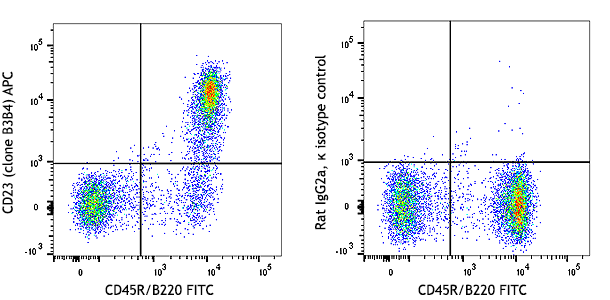
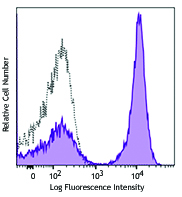
Compare Data Across All Formats
This data display is provided for general comparisons between formats.
Your actual data may vary due to variations in samples, target cells, instruments and their settings, staining conditions, and other factors.
If you need assistance with selecting the best format contact our expert technical support team.
-
Biotin anti-mouse CD23
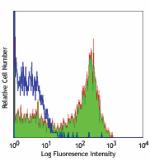
C57BL/6 mouse splenocytes were stained with biotinylated CD2... -
FITC anti-mouse CD23
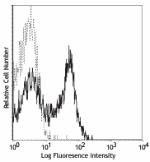
CD57BL/6 mouse splenocytes were stained with CD23 (clone B3B... -
PE anti-mouse CD23
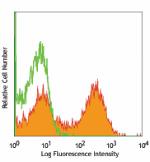
CD57BL/6 mouse splenocytes were stained with CD23 (clone B3B... -
Purified anti-mouse CD23
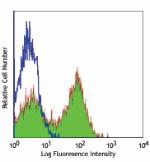
CD57BL/6 mouse splenocytes were stained with purified CD23 (... -
Alexa Fluor® 488 anti-mouse CD23
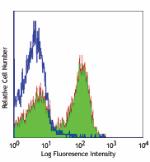
CD57BL/6 mouse splenocytes were stained with CD23 (clone B3B... -
Alexa Fluor® 647 anti-mouse CD23
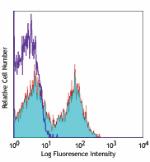
CD57BL/6 mouse splenocytes were stained with CD23 (clone B3B... 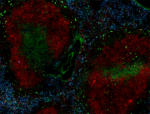
C57BL/6 mouse frozen spleen section was fixed with 4% parafo... 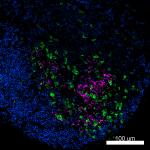
Mice were injected subcutaneously with sheep red blood cells... -
PE/Cyanine7 anti-mouse CD23
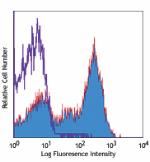
CD57BL/6 mouse splenocytes were stained with CD23 (clone B3B... -
Pacific Blue™ anti-mouse CD23
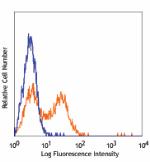
CD57BL/6 mouse splenocytes were stained with CD23 (clone B3B... -
PerCP/Cyanine5.5 anti-mouse CD23

C57BL/6 mouse splenocytes were stained with CD45R/B220 APC a... -
APC anti-mouse CD23

C57BL/6 mouse splenocytes were stained with CD45R/B220 FITC ... -
Brilliant Violet 421™ anti-mouse CD23
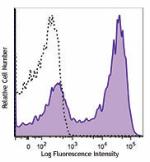
C57BL/6 mouse splenocytes were stained with CD23 (clone B3B4... -
Brilliant Violet 510™ anti-mouse CD23
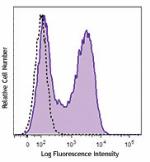
C57BL/6 mouse splenocytes were stained with CD23 (clone B3B4... -
Purified anti-mouse CD23 (Maxpar® Ready)
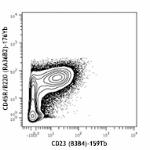
C57BL/6 mouse splenocytes stained with 176Yb-anti-CD45R/B220... -
APC/Cyanine7 anti-mouse CD23
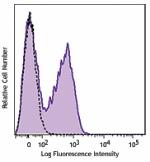
C57BL/6 mouse splenocytes were stained with CD23 (clone B3B4... -
Alexa Fluor® 700 anti-mouse CD23
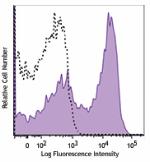
C57BL/6 mouse splenocytes were stained with CD23 (clone B3B4... -
PE/Dazzle™ 594 anti-mouse CD23
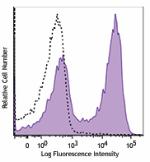
C57BL/6 mouse splenocytes were stained with CD23 (clone B3B4... -
TotalSeq™-A0108 anti-mouse CD23
-
Brilliant Violet 605™ anti-mouse CD23

C57BL/6 mouse splenocytes were stained with CD45R/B220 FITC ... -
TotalSeq™-C0108 anti-mouse CD23
-
APC/Fire™ 750 anti-mouse CD23 Antibody

C57BL/6 mouse splenocytes were stained with anti-mouse CD45R... -
TotalSeq™-B0108 anti-mouse CD23
-
Brilliant Violet 785™ anti-mouse CD23

C57BL/6 splenocytes were stained with anti-mouse/human CD45R... -
Brilliant Violet 711™ anti-mouse CD23

C57BL/6 mouse splenocytes were stained with anti-mouse/human...

 Login / Register
Login / Register 










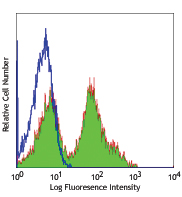
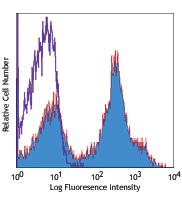



Follow Us